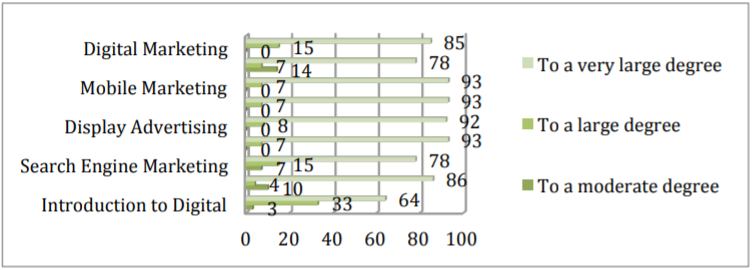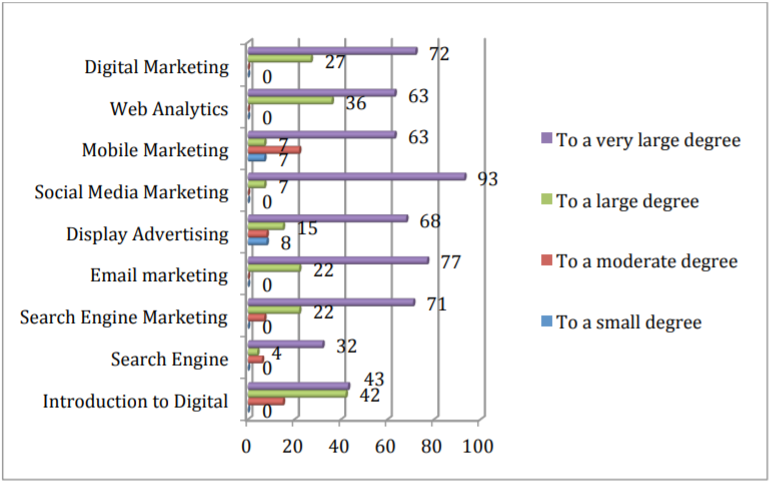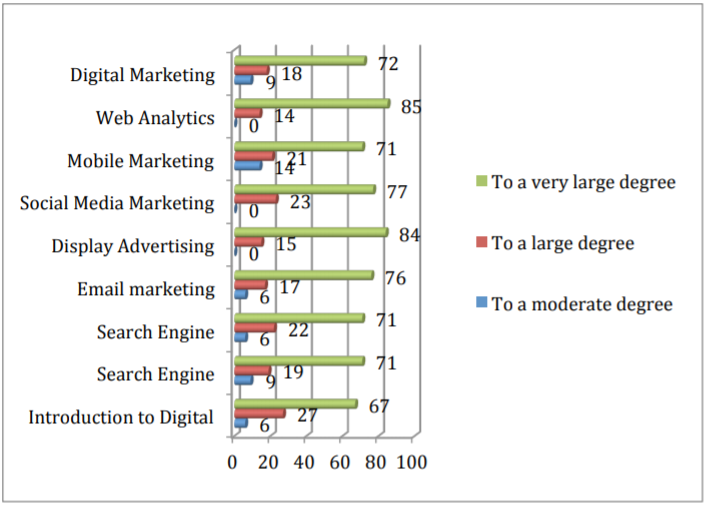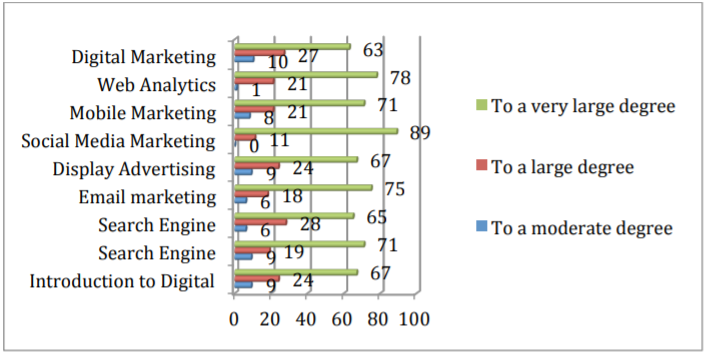Abstract
Why is it useful for adults to learn? Does learning at an adult age need to be done in a procedural way, guided towards a certain purpose or a more spontaneous and contextual manner is more useful? The current society with its dynamics, the way in which the labor market is configured and reconfigured demonstrate the fact that learning becomes an indispensable condition for adults to remain active professionally. The present paper emphasizes the adults’ interest as course attendants in the professional improvement, professional conversion or initiation into a new job on the labour market that requires solid digital competences. Generally, in order to be efficient, a curriculum that aims to activate learning in adults has to be focused mainly on problem solving. The purpose of this paper is to analyse the measure to which the curriculum of this program has answered the professional training needs of the adult participants of this program, developing the necessary abilities required to practice the new type of jobs found on today's labour market where solid digital competences are a must. The hypothesis of research is that we expect a high degree of satisfaction regarding the quality of the curriculum for all modules of the program. The target group was formed of 100 adults aged 24-46. The research method used was the survey-based research. The data obtained in the study confirm our hypothesis.
Keywords: Adult learningdigital competencesprofessional improvementprofessional conversion
Introduction
Realized usually individually or in a group, in an institution or outside it, adult education has the
purpose to enrich knowledge, develop necessary abilities and competences in order to successfully cope
with the social and professional requirements (Dumitru, 2002). Permanent education, countervailing
education (or second chance education) and entrepreneurial education have become throughout time,
derived components of adult education.
Born from the practice of adult education and the problems that it brought, as one of the efforts to
respond to the ever-growing demand of education, „continuous education” was identified as a revolution
in education, being later continued with the concept of „lifelong learning”. Lifelong learning has the
premise that the individual mixes formal and traditional education with alternative education, enabling
innate qualities and the acquiring of new competencies (Delors, 2000). Continuous education requires
permanent learning that in a constructivist conception emphasise the perspective of continuing learning
from childhood, until old age, considerably extending the concept of learning that doesn’t only refer to
organised scholastic learning but also contains a multitude of formal and informal activities (Dave, 1991).
Current society with its dynamics, the way in which it continuously configures and reconfigures
the labour market, demonstrates the fact that learning becomes an indispensable condition for adults to
remain active professionally. The growing rate of unemployment at an adult age, from year to year, has
generated in the workforce policies, the need for launching professional reconversion courses, new
qualifications in accordance with the new jobs that require new abilities. Therefore, we find in the
challenges of professional life of adults, learning to be a path, a very necessary resource for adapting and
integrating both professionally and socially. Currently training programs for adults represent a wide array
and are addresses to people who want to qualify/requalify professionally; the unemployed that wish to get
reoriented professionally as well as those to be made redundant; being open to all social categories. There
were identified four categories of organisations that offer adults the opportunities to learn: independent
organisations for adult teaching (private agencies and community agencies), educational institutions
(schools, colleges, universities); quasi-educational organizations (museums, organisms of the
community); non-educational organisations (chamber of commerce, companies (Kidd, 1981).
Through the basic requirements for all who assure active participation in the knowledge society
(according to the European Council in Lisabona - 2000) we find the IT abilities and the entrepreneurial
spirit, necessary for an active participation in today’s economy and cognitive society, on the labour
market and at the workplace, in real and virtual communities. Assimilating the basic skills represents a
condition for the integration into the social-professional life, especially since empowers have higher
demands regarding learning capacity and quickly acquiring new abilities, of responding to new challenge
and to solve concrete situations.
On the labour market a new career has appeared, that is ever-growing in popularity and number of
searches, that configures a new qualification for adults, that of the online marketing specialist. That means
that on one hand the specialists in classic marketing who need to assimilate competencies necessary to
make the transition from offline to online and the ones that wish to practice the profession, either as a
professional conversion or for the ones who wish to practice this professional as a professional
conversation or as a learning process for the essential skills in order to become an entrepreneur, this
audience has to go through a qualification program destined to develop online marketing skills.
Methodology of Research
The purpose of the paper is to analyse the ensure to which the curriculum of this type of program has
responded to the needs of professional training of adult participants to the program, developing the
necessary competencies to work in the online marketing field. The hypothesis of research is that we
expect a high degree of satisfaction in participants regarding the curricular quality of all modules of this
type of program. In order to verify the work hypothesis, we are using the Kirkpatrick model (2007) to
measure efficiency through progressive evaluation on 4 levels: Reaction, Learning, Behaviour, Results.
Research Context
According to inboundmarketingagents.com., 44% of Direct Mail is Never Opened. (via the EPA),
86% of People Don't Watch Television Ads. (via The Guardian), 59% of B2B marketers find email is the
most effective channel for generating revenue. (via BtoB Magazine), 84% of business to business
marketers use some form of social media. (via the Aberdeen Group), 53% of B2B Marketers Have
Acquired a Customer through Facebook, and 44% through Twitter. (via HubSpot).
Marketing signifies „the science and art of making clients buy” (apud. N. Borden, 1965), today’s
internet facilitating enhanced ways of promoting company products and services or entrepreneurial
initiatives. Therefore, new online marketing abilities are required which specialists in the field or those
willing to enter the field, need to acquire.
Which are these competences more precisely? Using the internet in promoting products or
services, includes the following abilities:
Optimising websites for search engines (SEO)
Promoting through advertisements on Search Engines
Creating advertising campaigns via email marketing
Promoting with the aid of display banners
Promoting with the help of social media by building a community around the product or service
Promoting to users of mobile phones
Measuring performance of the marketing campaign on any of the specific marketing channels
Creating strategy to efficiently combine promotion on all of the online marketing channels in
order to get the expected results.
There are several providers of such courses on the market today, the curriculum for training such
abilities in this field being similar, that being a structure based on modules in accordance with the above-
mentioned competences delivered through several methods: videos, webinars and interactive e-workshops
or in-class sessions, that offer practical information about using the Internet as an efficient marketing
channel. From these providers, we have selected one that offers a professional diploma certification that
has a curriculum for training the abilities described above comprised of 9 modules (mentioned in the
below research).
Methods of Research
The research method used was the survey-based research. The survey, which identifies the degree
of satisfaction of attendants regarding the course curriculum, had a number of 4 items derived from the
Kirkpatrick model of measuring the efficiency through progressive evaluation on 4 levels: Reaction,
Learning, Behaviour, Results. Therefore, item number 1, corresponding to level 1 – Reaction measures
what the participants think of the curricular quality of each module, in general. Item 2 – level 2. Learning
measures what participants actually learnt. Item 3 – level 3. Behaviour measures the degree of
implementation of information, its transfer to the level of behaviour; item 4 – level 4. Results – measures
the impact on the organisational environment through the effects it can produce. The survey was applied
online, the respondents (graduates of the course, but with different providers) were contacted via
LinkedIn and requested to respond.
Sampling
The target group is formed of 100 adults aged 24-46 (of which 65 specialists in classic marketing
and 35 university graduates and want to start their own business and need the online marketing
competences n order to promote their business). We used random sampling.
Results
Starting from the particularities of adult learning, a curriculum for adults assures that learning is
focused on problem solving. The advantages of such an approach consist in the „systematic nature and
comprehensive character” (Mucchielli, 1982) and creating an experiential type of learning through
reflection and implementation.
In the present case, we verify the measure to which the program curriculum was mainly focused
on problem solving through:
•Curricular quality of each module (the novelty of information being especially targeted); •The detail level of information that assures the thorough assimilation of content (sufficient
explanations and exercises, examples of relevant good practices);
•The utility and transferability obtained, in the professional activity of adult participants; •The measure to which the information presented in every module is relevant to the activity of
adults and allows a paradigm change on what they previously knew.
We are therefore using the measurement model of e-learning efficiency which is the Kirkpatrick
model of progressive evaluation on four levels: Reaction, Learning, Behaviour, Results for verifying the
work hypothesis and the results obtained were the following:
Level 1. Reaction – measures the feedback of participants regarding the curriculum quality of each
module (the novelty of information being especially targeted). We are verifying the degree of attainment
of this level, through the analysis of results of the following item: „Appreciate the curriculum quality for
each level”

Data indicates a high level of satisfaction regarding the approached subjects, especially in the
Display Advertising and Social Media Marketing modules where we can observe a high average of 4.93,
respectively 4.89, for a standard deviation of 0.258, respectively 0.314.
Level 2. Learning – measures what participants actually learnt. We are verifying the degree of
attainment of this level, through the analysis of results of the following item: To what degree a detailing
of information was done to allow the thorough assimilation of content (sufficient explanations and
exercises, examples of relevant good practices)

Although the Display Advertising module had a high score regarding the relevancy of the
approached subjects, the participants wanted a higher level of detailing of information. The social media
marketing module considered highly relevant as approached subjects, benefits in the opinion of
participants of an adequate degree of detail, a fact which comes out from the growth of the average of
4.93, on a standard deviation of 0.256.
Level 3 – Behaviour – measures the degree of implementation of information, its transfer to the
level of behaviour. We are verifying the degree of attainment of this level, through results analysis of the
following item: „To what degree you find the information from this module useful and applicable to your
activity?”.

Very useful was considered the information presented in the Display Advertising module (with an
average of 4.85) and Web Analytics (with an average of 4.86), followed by the Social Media Marketing
(both with an average of 4.77).
Level 4. Results – measure the impact on participants through the effects it can produce.
To what degree the information presented in each module is relevant for your activity and allows a
change of paradigm on what you already knew about social media.

All information in the modules is considered by participants as relevant to their professional
activity in online marketing. Yet there remain 2 constant modules, those of Social Media Marketing (with
an average of 4.84 and a standard deviation of 0.368) and Web Analytics (with an average of 4.79, and a
standard deviation of 0.411), as highly relevant to their fields of professional activity in online marketing.
Interpretations
Our work hypothesis: we expect a high degree of satisfaction in participants regarding the
curricular quality of the entire program’s modules that assure the necessary competences in
online marketing, is confirmed. The competencies taught in each module of this course are the
following: module Introduction to Digital Marketing has an argumentative role regarding the
importance of the internet in promoting a campaign, while the Search Engine Optimization
module, aims to develop the abilities of optimising websites for search engines. Search Engine
Marketing, shapes up abilities in advertising on search engines; the Email Marketing module
creates abilities in running advertising campaigns based on email while the Display Advertising
module targets competences in promoting through display banners. Social media marketing
creates abilities in promoting with the help of social networks by building a community around
the product or service being promoted. The module Mobile Marketing creates competences of
promoting to users of mobile phones, mainly smartphones. Web analytics module aims to
measure the performance of an advertising campaign on any of the online marketing channels,
specific to the other modules, while the Digital Marketing Campaign Planning module aims to
develop the competencies of creating a strategy that efficiently combines the online marketing
channels described above.
Data analysis based on Kirkpatrick’s model, shows the fact that the participants’ reactions
measured through appreciations related to the curriculum quality of each module shows a high
level of satisfaction regarding the approached topics, especially in the modules Display
Advertising and Social Media Marketing where we can observe a very high level of the average
4.93, respectively 4.89, with a standard deviation of 0.258, respectively 0.314.
Analysing to what degree a detailing of the information was delivered, so that the content
was thoroughly learnt, we can observe that although the Display Advertising module has a high
score regarding the relevancy of the approached topics, yet the participants desired a higher
degree of information detail. The module of Social Media Marketing, considered highly
relevant regarding approached topics, benefits in the opinion of participants of a high degree of
information detail, a fact that comes out from the growth of the average level of 4.93, for a
standard deviation of 0.256.
The utility and transferability of information for each module in the professional activity
of participants, becomes evident through the appreciation of participants regarding the program
modules, especially useful being considered the information presented in the Display
Advertising module (with an average of 4.85) and the Web Analytics module (an average of
4.86) followed by Social Media Marketing (with an average of 4.77).
All the information contained in the modules is considered by participants as relevant to
their professional activity in the field of online marketing. The constants are modules Social
Media Marketing (average of 4.84 with a standard deviation of 0.368) and Web Analytics (an
average of 4.79, with a standard deviation of 0.411), with a high degree of relevancy for their
field of professional activity within online marketing.
Conclusions
In adult education it’s in demand to approach curriculum from a problem solving perspective, by
integrating and capitalising previous experience. In specialty literature a supported thesis is that adults are
motivated to learn when their reasons and interests are satisfied. The program that targets the
development of necessary competences for working in the field of online marketing, shows a high degree
of satisfaction in adult participants, the designed and taught curriculum having a good integration with a
problem-focused approach and with correlations on previous experience by participants. We estimate for
the future an ever growing interest of adults to participate in such courses that develop digital
competences necessary in more and more jobs of the future according to the reconfigurations of the
labour market, on one hand, while on the other hand a growing availability of training providers for adults
that offer such courses, in accordance with the existing need.
References
- Dave, R. H. (1991). Fundamentele educaţiei permanente. Bucureşti: Editura Didactică şi Pedagogică
- Delors, J. (2000). Comoara lăuntrică. Iaşi: Editura Polirom
- Dumitru, Al. I, Iordache, M. (2002). Educaţia la vârsta adultă şi elemente de management şi marketing
- aplicate în educaţia adulţilor. Timişoara: Editura Eurostampa
- Jigău, M. (2003). Consilierea carierei adulţilor. Bucureşti: Editura Afir
- Kidd, J. R (1981). Cum învaţă adulţii. Bucureşti: Editura Didactică şi Pedagogică
- Kirkpatrick, D.L., Kirkpatrick, J.D. (2007). Implementing the Four Levels.San Francisco: Berrett-Koehler Publishers
- Lengrand, P. (1973). Introducere în educaţia permanentă. Bucureşti: EdituraDidactică şi Pedagogică
- Mucchielli, R. (1982). Metode active în pedagogia adulţilor. Bucureşti: Editura Didactică şi Pedagogică www. inboundmarketingagents.com
Copyright information

This work is licensed under a Creative Commons Attribution-NonCommercial-NoDerivatives 4.0 International License.
About this article
Publication Date
25 May 2017
Article Doi
eBook ISBN
978-1-80296-022-8
Publisher
Future Academy
Volume
23
Print ISBN (optional)
-
Edition Number
1st Edition
Pages
1-2032
Subjects
Educational strategies, educational policy, organization of education, management of education, teacher, teacher training
Cite this article as:
Porumb, I., & Chircu, S. (2017). Adult Learning For New Job Skills Using Technology. In E. Soare, & C. Langa (Eds.), Education Facing Contemporary World Issues, vol 23. European Proceedings of Social and Behavioural Sciences (pp. 1400-1407). Future Academy. https://doi.org/10.15405/epsbs.2017.05.02.171

